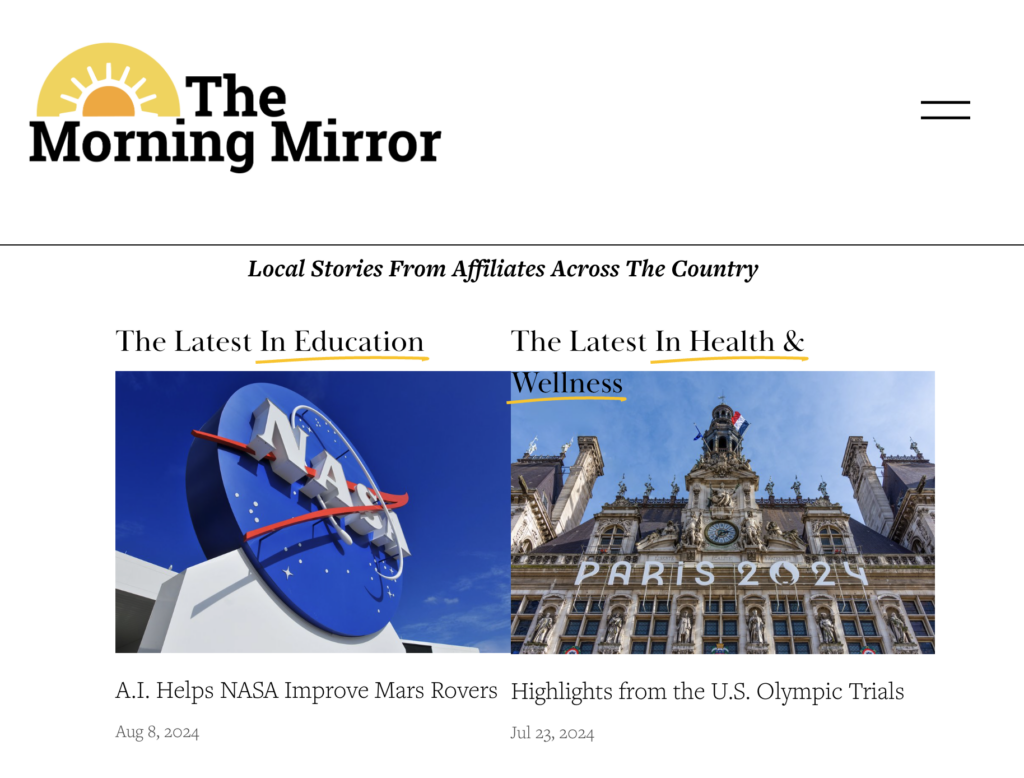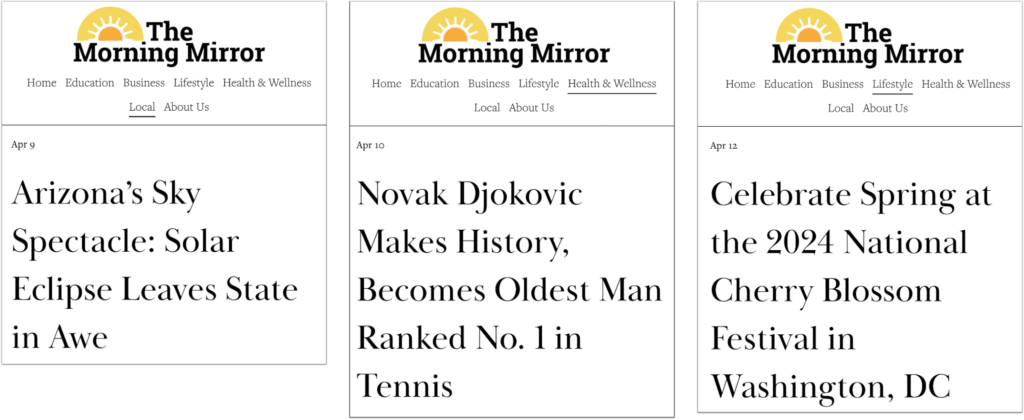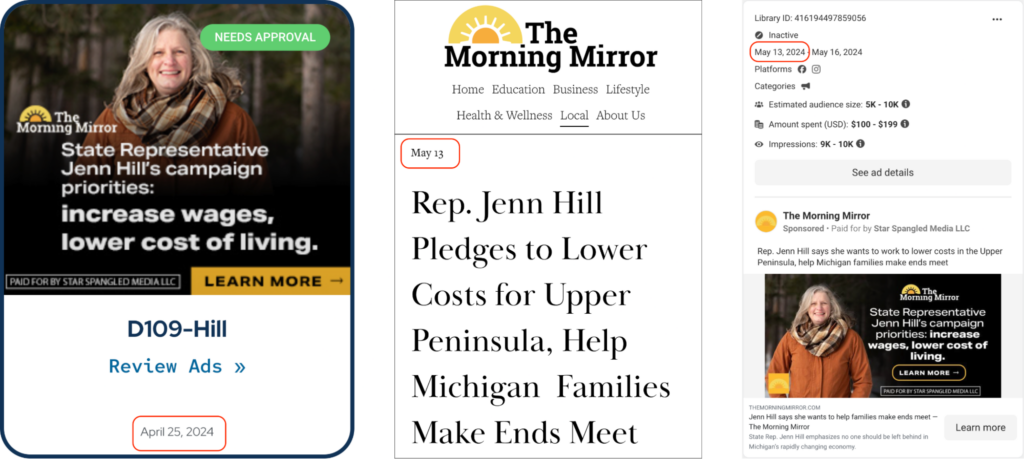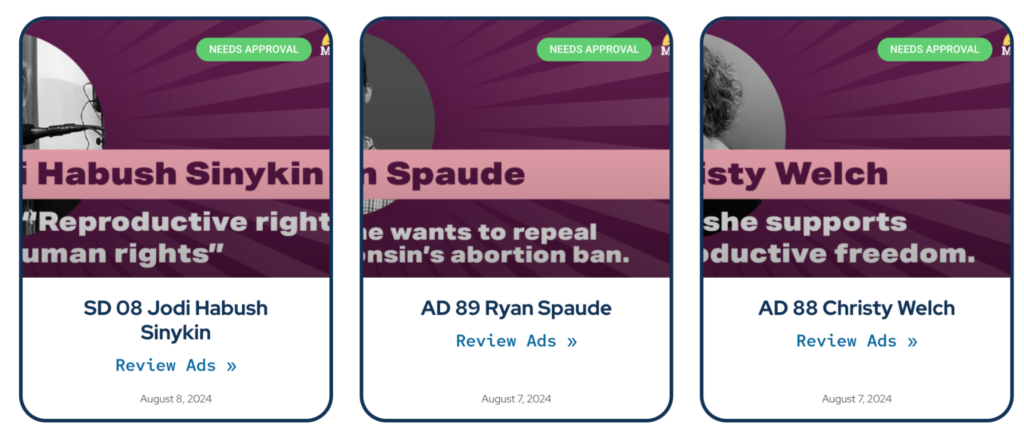Sign up for The Media Today, CJR’s daily newsletter.
A quasi-local news site whose operators sought a news media exception to dodge campaign finance regulators has emerged as a vehicle to promote down-ballot Democratic candidates in districts targeted by a liberal dark-money group.
The weaponization of local news by political influence operations is a practice more commonly associated with conservative groups, such as Metric Media’s “pink slime” network. But this tactic has gained popularity across the political spectrum, polluting local information environments with untrustworthy, sensational, and/or polarizing propaganda that risks undermining faith in legitimate local journalism.
The Morning Mirror was created earlier this year and lists Star Spangled Media LLC as its owner. Posing as a local news aggregator, the rudimentary, Squarespace-hosted site has many of the hallmarks of the kind of quasi-local journalism that has gained popularity in recent years. It does not have a masthead, its output is sporadic and thinly reported (often regurgitating copy from election candidates’ own websites), its articles do not carry bylines, and it doesn’t appear to attract any kind of audience or engagement on social media.
But recent efforts to convince Arizona legislators that the site is a legitimate press entity and should qualify for a news media exemption make the Morning Mirror more than just another politically motivated quasi-local news site.

Digital forensic analysis by the Tow Center for Digital Journalism has unearthed evidence that appears to show close ties between the Morning Mirror and a liberal dark-money group called Forward Majority.
By triangulating data from the Meta Ad Library, article content and metadata from the Morning Mirror website, memos published to the super-PAC’s website, and publicly accessible pages on the client portal of one of Forward Majority’s preferred advertising agencies, our findings highlight far stronger ties between Forward Majority and the Morning Mirror’s owner, Star Spangled Media, than have previously been reported.
Not only did we uncover clear overlap in Morning Mirror’s paid Meta ads and the tiny subset of legislative districts Forward Majority has targeted for the 2024 election, we also found a raft of image files used to produce Morning Mirror ads—visible on the ad agency’s client portal—with file names that contain an abbreviation of the super-PAC’s name, “FwdMaj.”

Forward Majority
Forward Majority is a super-PAC formed in 2017 to help Democratic candidates in state legislative races. It is affiliated with Forward Majority Action PAC and has numerous state-specific spin-offs. Forward Majority Action Michigan was the biggest recipient of funds from Forward Majority Action PAC in the 2022 election cycle.
At the super-PAC’s 2017 launch, Politico wrote, “Forward Majority’s model includes targeting more races than most local parties or state caucuses are likely to touch. The goal is to flip chambers from GOP hands to Democratic control by using the kinds of expensive campaign tactics seldom used in such local races, including polling and message testing.”
In a “Blueprint for Power” concept note published in January 2022, Forward Majority outlined “Three Accelerants to Build Power.” The second of these, “Long-Term Narrative and Brand Development with Key Audiences,” prescribed the perceived problem for Democrats:
An Out-of-Date Playbook Can’t Compete with Right-Wing Propaganda: [T]he vast majority of ordinary voters spend only moments making their vote choice, a decision dominated by existing narratives about the parties, increasingly influenced by right-wing media, disinformation and propaganda.
This was followed by a vision of a solution, which largely amounted to a strategy of fighting fire with fire:
Opportunity to Cut Through by Building Local Narrative and Brand: To counter this, particularly in Republican trifecta states, Democrats need a local communications operation that is similarly relentless, but more astute and opportunistic. Going forward, as we continue to move new voters into the electorate—and long before campaign season starts—we must help to reshape local political narratives in our targeted districts.… What’s needed is cutting-edge approaches to content sourcing, testing, and dissemination, leveraging earned and paid media.
This strategy alludes to the growing trend for exploiting the local news crisis by flooding the information ecosystem with quasi-news content that uses the veneer of independent local journalism to propagate partisan political narratives, often with a focus on swing states and aided by the low-cost microtargeting facilitated by social media platforms. Examples from the right, such as the vast Metric Media network (covered extensively by Tow Center research) and the Star Network, have led the left to counter with efforts from the likes of Courier Newsroom, which was originally funded by liberal dark-money group ACRONYM, the American Independent Network, and the Main Street Sentinel.
Star Spangled Media LLC
Star Spangled Media first rose to prominence in March 2022 when Axios‘s Lachlan Markay reported that the newly formed organization was behind the Main Street Sentinel, a freshly created quasi-news site of opaque provenance that had started spending large sums on Facebook ads ahead of that year’s midterm elections.
The Main Street Sentinel was live for less than a year but spent over $1.4 million on Meta ads, most of which targeted users in Michigan. Tow Center research has also revealed that the Main Street Sentinel was frequently cited in mailers sent to Michiganders’ homes by a group funded by Forward Majority Michigan. The Main Street Sentinel’s website was removed shortly after the midterm elections.
Until recently it seemed Star Spangled Media was as dormant as the Main Street Sentinel.
But last month, Semafor reported that attorneys for the Elias Group—”the law firm led by Marc Elias, perhaps the Democratic Party’s best known elections litigator and a central player in 2024’s politics”—had written to Arizona’s campaign finance regulator on behalf of Star Spangled Media seeking guidance on whether its client’s website, the Morning Mirror, qualified for a press exemption under the state’s Voters’ Right to Know Act. Where granted, the exemption spares journalism organizations from having to make financial disclosures to state or federal campaign regulators.
In the letter, to Arizona’s Citizens Clean Elections Commission, dated May 28, 2024, attorneys for the Elias Law Group sought “confirmation that (1) [Star Spangled Media LLC’s] intended activities do not constitute ‘campaign media spending’ under the Voters’ Right to Know Act (‘VRKA’); and (2) it is not a ‘covered person’ under VRKA.” The attorneys asserted that “Star Spangled Media regularly disseminates political and non-political news stories, commentaries, and editorials; in fact, that is its sole business function.” Quoting the FEC, they continued, “Like other media entities, Star Spangled Media ‘retains editorial and formatting control over the content’ of its news stories, commentaries, and editorials.” Referencing the FEC’s two-part test for determining media exceptions, they added, “Star Spangled Media is not owned, operated, or controlled by a candidate, a candidate’s spouse or a candidate committee, political party or political action committee, and accepts no funding from any such entity.”
Following an assessment of the Morning Mirror’s website and Meta ads, Arizona regulators concluded that while the site did meet the criteria to qualify as a “news entity,” Star Spangled Media did not qualify for a press exemption due, in part, to a lack of transparency about its output. The advisory opinion stated:
Because The Morning Mirror has extremely limited output, and there is no information available about its editorial process, it is impossible for the Commission to determine whether its political articles—many of which appear to be generated by using campaign created media—go through the same process as its non-political articles. In other words, under the “considerations of form” analysis, the Commission cannot conclude “there is no indication that those articles were not produced in the same manner, using the same people, and subject to the same review and distribution as its other articles.” FEC MUR 7789 at 19. Thus, the Morning Mirror may be engaged in campaign media spending, rather than acting within the press exception.
Because the Commission cannot conclude the press exception applies, the Commission cannot conclude that Star Spangled Media is not a covered person and does not intend to engage in campaign media spending. Equally importantly, however, the Commission is not concluding the opposite—simply put more facts about Star Spangled Media’s internal operations and news presence in Arizona would be necessary for the Commission to reach a reasoned conclusion about whether the press exception applies.
In his advisory opinion, the commission’s chairman, Mark S. Kimble, noted, “The second part of the [FEC] test first requires the Commission to consider whether the entity is owned or controlled by a party, committee, or candidate. Here, based on the representations of the company, the Commission concludes none of those categories of persons owns or controls the company, meeting this part of the test.”
While our evidence does not disprove any of this, it highlights a level of convergence between Forward Majority’s interests and the operation of the Morning Mirror that seems unlikely to be explained by coincidence.
The Rapid Deployment of the Morning Mirror
The Morning Mirror’s basic infrastructure was created in March 2024. ICANN records show the website’s domain—themorningmirror.com—was registered on March 22, 2024. A Facebook page, on which it categorizes itself as a “Media/news company,” was created, along with profile and cover images, on March 27, 2024. An Instagram page—@morningmirror24—was also created in March.
As of August 20, the Morning Mirror has published a total of 119 articles. Website metadata shows that Star Spangled Media began populating the Morning Mirror early in April, when three generic news articles were added to different sections of the site: an article about a solar eclipse in Arizona was added to the Local section on April 9, an article about international tennis was added to the Health and Wellness section on April 10, and an article about a flower festival in Washington, DC, was added to the Lifestyle section on April 12. All three were cross-posted to Facebook and Instagram on April 30.

Highlighting the amateurish nature of the operation, all three had slugs that began “blog-post-title-one-“:
- https://www.themorningmirror.com/local/blog-post-title-one-3s9w6
- https://www.themorningmirror.com/health-wellness/blog-post-title-one-ympfg
- https://www.themorningmirror.com/lifestyle/blog-post-title-one-lhpwn
The Morning Mirror doesn’t display bylines by default, but they are present in article metadata. According to this data, the three initial posts made to the Morning Mirror were authored by someone named David Cohen. (David Cohen is the name of Forward Majority’s cofounder and co-CEO. I reached out to Cohen in March for comment about the frequency with which the Main Street Sentinel was cited in mailers funded by Forward Majority Michigan and sent to Michiganders ahead of the 2022 midterm elections. He did not respond.)

As Semafor noted in its reporting, almost all subsequent Morning Mirror articles have been attributed to someone named Lucas Anderton.

Lucas Anderton is director of creative design at SBDigital, a “progressive digital advertising and fundraising firm based in Washington, DC.”
SBDigital lists Forward Majority as a recent client on its homepage. Michigan campaign finance records show that during the 2022 midterm election cycle Forward Majority Michigan paid SBDigital a total of $1,497,607.99, most of which was categorized as digital advertising ($2,177.58 was categorized as digital ad production). This sum comprised 246 payments of between $1,685.68 and $28,688.91 made between September 16 and October 28, 2022. Writing on X, Markay—the Axios reporter who first covered Star Spangled Media in 2022—noted the similarity between this figure and the $1,412,891 (approx.) spent on Meta ads for the Main Street Sentinel during the 2022 midterms, according to the Meta Ad Library.
According to Open Secrets, SBDigital’s biggest payer during the 2024 election cycle has been Forward Majority Action, which has paid the agency $412,803 in seven installments between August 24, 2023, and March 18, 2024.
Star Spangled Media’s modest but insightful ad spend
Star Spangled Media first bought Meta ads for Morning Mirror stories on May 13, 2024. As of August 20, the group has spent $88,938 on 90 ads for the site, all of which focus on individual Democratic candidates involved in down-ballot races.
The production and content of these ads provides some of the strongest clues about Forward Majority’s possible ties to the site.
Star Spangled Media’s precise focus on Forward Majority’s target states
One striking area of convergence between the Morning Mirror and Forward Majority is the news site’s razor-sharp focus on promoting down-ballot Democratic candidates in the tiny handful of districts targeted by the super-PAC.
In April 2024, Forward Majority published a memo in which it identified “41 Districts That Need to Be a 2024 Priority for Democrats.”
These 41 legislative districts are spread across four states: ten in Arizona (six house, four state senate), nine in Michigan (all house), ten in Pennsylvania (eight house, two senate) and twelve in Wisconsin (nine house, three senate).
Star Spangled Media’s 90 ads for Morning Mirror articles promote Democratic candidates in 34 Senate and House districts across Michigan, Pennsylvania, and Wisconsin—three of the four states that house the target districts Forward Majority identified in its April 2024 memo. The other, Arizona, is the state where Star Spangled Media’s claim to a news media exemption was rebuffed.
Of the 34 districts for which Morning Mirror ads have been purchased, 29 match with Forward Majority’s 31 targets in Michigan, Pennsylvania, and Wisconsin.

Nationally there are 6,766 legislative districts (1,938 senate and 4,828 house districts), according to Ballotpedia. The 41 districts targeted by Forward Majority therefore represent just 0.6 percent of the national total.
Zooming in on the three states where Star Spangled Media has focused its Morning Mirror ad campaign, Michigan has 38 senate and 110 house districts, Pennsylvania has 50 senate and 203 house districts, and Wisconsin has 33 senate and 99 house districts. Thus, there are a combined 533 legislative districts across these three states, of which Forward Majority’s 31 targets constitute less than 6 percent.
For there to be such close overlap between the tiny subset of districts Forward Majority is targeting and the output and ad spend of the Morning Mirror seems too unlikely to have occurred by happenstance.

The legislative districts targeted by Forward Majority in Michigan, Pennsylvania, and Wisconsin, and those featured in Morning Mirror articles for which Star Spangled Media has bought Facebook/Instagram ads.
Buried references to Forward Majority in Morning Mirror ads
Morning Mirror’s Meta ads are managed by SBDigital. We found three separate client pages for state-specific variations of the Morning Mirror on SBDigital’s client portal:
- Morning Mirror – Michigan contains 22 ads
- Morning Mirror – PA contains 22 ads
- Morning Mirror – WI contains 25 ads
Each client page contains “draft creative sets” of Morning Mirror ads to be used on Meta platforms. These draft ads are largely indistinguishable from the Facebook and Instagram ads purchased by Star Spangled Media and available in the Meta Ad Library.
Each creative set has a naming convention that relates to the chamber, district, and candidate for which ads have been produced. Where applicable, they also identify the hot-button topic on which ads focus, e.g.
- “HD 109 Hill – Abortion” (State Representative for Michigan House District 190 Jenn Hill)
- “SD 30: Wall – Economy” (candidate for Wisconsin Senate District 30 Jamie Wall)

Ads for Michigan have the earliest start date—April 17, 2024. The earliest date for Pennsylvania ads is May 13, while the first for Wisconsin are dated July 30.
The crossover between the subjects of SBDigital’s ad copy and Forward Majority’s target districts could hardly be stronger:
- The Michigan portal contains ads for Democratic candidates running in all nine of Forward Majority’s target districts for the state. It also contains two ads apiece for incumbents Rep. Jim Haadsma (Michigan House District 44) and Rep. Jenn Hill (Michigan House District 109).
- The Pennsylvania portal contains ads for Democratic candidates running in nine of Forward Majority’s ten target districts in the state. Additionally, there are two ads apiece for candidates Hadley Haas (Pennsylvania House District 44) and Eleanor Breslin (Pennsylvania House District 143).
- The Wisconsin portal contains ads for Democratic candidates running in eleven of Forward Majority’s twelve target districts in the state. It also contains two ads for Joe Plouff and one for Caden Berg, who faced off in the August 13 primary to decide the Democratic candidate for Wisconsin’s 92nd Assembly District. This district has, however, been identified as a Forward Majority target in a different context, having been included in a list of “13 Races Democrats Must Prioritize to Protect Abortion” the group published in June 2024. It was the only district in this newer subset of abortion-specific targets that was not in the 41-strong list of overall targets published in April.
Each ad in the SBDigital client portal has a templated preview page showing how the proposed copy will appear in different digital environments—programmatic display ads, paid Facebook and Instagram feed posts, paid Facebook and Instagram Stories, and organic Instagram posts.

Previews on SBDigital’s client hub showing how draft Morning Mirror ads will appear on Meta platforms.
A comparison of time stamps shows that 46 of the 53 ads in the SBDigital client portal that have corresponding pages on the Morning Mirror website were posted in advance of the articles they promoted (87 percent). In four cases, time stamps on ad copy preceded publication of the corresponding “news” stories by over two weeks.
In the most extreme example, copy for an ad promoting Hill’s campaign priorities was posted to the SBDigital client portal eighteen days prior to the corresponding article’s publication date (April 25 vs. May 13). The article’s paid Facebook ad, the content of which matches that posted to SBDigital’s client portal, launched on the same day.

Although the client names used on SBDigital’s client portal are the state-specific variations of the Morning Mirror (“Morning Mirror—Michigan,” “Morning Mirror—PA,” etc.), HTML source code of ad previews provides the strongest clue about Forward Majority’s ties to the site.
Analysis of the HTML source code on SBDigital’s preview pages revealed 22 ads containing images with file names that began “FwdMaj”—an apparent abbreviation of Forward Majority.

These images were contained in directories that suggest they were uploaded in April, June, and July of this year. File names for images in the April directory begin “FwdMaj-Boost,” whereas those in the June and July directories begin “FwdMaj-Refresh.“
April 2024:
https://clients.sbdigital.com/wp-content/uploads/2024/04/FwdMaj-Boost-JaimeChurches_300X250-2.jpg
June 2024:
https://clients.sbdigital.com/wp-content/uploads/2024/06/FwdMaj-Refresh-Trevis55_300X250.jpg
July 2024:
https://clients.sbdigital.com/wp-content/uploads/2024/07/FwdMaj-Refresh-160Moro_300x250.jpg
We presented our findings to Forward Majority and SBDigital in an email requesting comment. Neither responded.
“Local News” about Democrat candidates’ pro-choice credentials
In a June 2024 press release announcing a seven-figure investment in its “new ‘Protecting Abortion in the Battlegrounds’ initiative,” Forward Majority declared, “This election cycle, abortion access isn’t just on the ballot—it will be one of the key issues deciding 2024.”
One of the foremost ways through which Star Spangled Media has used Meta ads for Morning Mirror articles is to promote the pro-choice credentials of Democrats in Forward Majority’s target districts. This began in Michigan before expanding to Pennsylvania.
Michigan
On June 15, the Morning Mirror began an eleven-day sequence of publishing one article per day that highlighted the pro-choice credentials of a Democrat involved in a down-ballot race in Michigan. Democrats contesting all nine of Forward Majority’s target districts in Michigan received this treatment, e.g.,
- “Rep. Jaime Churches Says She Supports Women’s Reproductive Rights in Michigan” (June 15)
- “For House candidate Janise O’Neil Robinson: Protecting Reproductive Rights Is Personal” (June 16)
- “State Rep. Joey Andrews Advocates for Abortion Rights in Michigan House Race” (June 17)
On July 1, once all of the personalized pro-choice articles were in place, Star Spangled Media made a Meta ad purchase to get the articles in front of Michiganders.
The group spent between $5,900 and $6,989 on eleven ads—one for each article—which received 555,000–644,989 impressions among Michigan-based Facebook users, according to the Meta Ad Library.
All had “Michigan Local News” in the link description field, while the body text, link titles, and images all focused on the pro-choice credentials of the corresponding candidate.
Useful context for this comes from SBDigital’s client hub. On the preview pages for draft ads, SBDigital identifies four “primary elements” comprised in paid Facebook and Instagram ads. The “Meta Description”—described as “the very subtle text below the headline” in Facebook feed ads—is what Meta terms the “ad_creative_link_description.” This is the section in which “[State] Local News” has routinely been entered for ads promoting candidates’ pro-choice credentials, suggesting that this wording is an active choice on the part of the ad agency—presumably with the client’s approval.

Pennsylvania
Beginning July 1, Star Spangled Media repeated this process for Pennsylvania, posting one pro-choice article per day to the Morning Mirror website over eleven consecutive days. Nine focused on candidates from one of Forward Majority’s ten target districts in the state.
On July 22, the group spent the modest sum of $1,389 on eleven ads targeting these stories at Facebook and Instagram users in Pennsylvania. These ads received 82,000–100,989 impressions, according to the Meta Ad Library.
In every case, the link titles, ad copy, and visuals highlighted individual Democratic candidates’ pro-choice credentials, e.g., “James Haddock’s pro-choice fight—The Morning Mirror.”

Wisconsin
Articles and Meta ads promoting the pro-choice credentials of Wisconsin candidates have not yet surfaced. However, eleven draft ads for as yet unpublished articles were added to SBDigital’s “Morning Mirror—WI” client hub on August 7–8. All eleven focus on Democratic candidates in one of Forward Majority’s twelve target districts for the state.
A twelfth draft ad was added on August 14, focusing on Joe Plouff, a participant in the August 13 primary to decide the Democratic candidate for Assembly District 92. While not among Forward Majority’s original list of targets, this district did feature in the group’s “13 Races Democrats Must Prioritize to Protect Abortion,” published in June 2024.

The Morning Mirror is just the latest proof that quasi-local news sites not only remain a popular tactic for electioneering, but are far from exclusive to the political right.
The site’s ad spend is modest and its audience is likely minuscule. But as Anne Nelson, author of Shadow Network: Media, Money, and the Secret Hub of the Radical Right, has noted, when political influence operations target specific segments of the electorate, they “don’t need a big audience; [they] don’t even necessarily want a big audience.”
That is particularly true of tight down-ballot elections decided by tiny margins. In a June 2024 press release, Forward Majority described how its “Protecting Abortion in the Battlegrounds” initiative was designed to reach “super voters” in states Democrats won by “razor thin margins” in 2020 and where the “tiny margins are even more extreme down-ballot.”
That the Morning Mirror will likely go the way of the Main Street Sentinel after November’s election is immaterial. As I argued in January, one of the most insidious threats posed by the Morning Mirror and its ilk extends beyond any one producer, dark-money group, network, outlet, or narrative. Such sites risk increasing perceptions that “the local information environment is being—or has been—reduced to a battleground for deep-pocketed special-interest groups from opposite ends of the political spectrum to launder political narratives dressed up as independent local journalism.” By fueling the pollution of local information ecosystems, such sites undermine trustworthy, transparent journalism and other democratic institutions.
As was noted at the outset, the fact that efforts were made to secure a media exemption for Star Spangled Media elevates this case to a higher level.
Star Spangled Media’s collision with Arizona’s Citizens Clean Election Commission offers an ideal opportunity to consider the complexity of the legislative guardrails that quasi-news networks put to the test.
On the one hand, Arizona regulators’ refusal to grant Star Spangled Media an exception may be what’s spared citizens in that state from targeted Morning Mirror ad campaigns akin to those in Michigan, Pennsylvania, and Wisconsin. In that regard the system survived the stress test.
Yet the same commission concluded that the Morning Mirror is a press entity.
At the public meeting where the commission’s advisory opinion about Star Spangled Media was presented and approved, commissioners and staff members engaged in a lengthy debate that highlighted the complexities of systematizing a framework to determine what does and does not qualify as journalism.
Having listened to executive director Thomas M. Collins’s rationale for denying Star Spangled Media an exemption, Chairman Kimble – a thirty-five-year veteran of the Arizona Record before its shuttering, in 2009—voiced his concern about the “number of websites that purport to be news websites” when “to even the casual reader it is clear the[ir] purpose…is to support certain candidates or certain points of view.”
“Would they be exempt because they are cloaking their political views with some kind of canned news?” he asked.
After seven minutes without a definitive answer, Kimble added, “I guess my bottom-line concern is, are we potentially opening up a loophole that Proposition 211 was designed to close, telling people that if you put some general other stuff around your political message, it therefore becomes media?”
Collins defended the robustness of the current framework, but almost ten minutes later he was musing on the possibility of establishing “a better, more black-and-white, definitive way that provides more guidance and/or maybe reaches a conclusion that…”
He trailed off before adding, “I mean, I don’t know, we would have to do that research.”
The Tow Center maintains a list of politically backed and partisan news sites here. It includes details of individual networks, copies of physical mailers that have been sent, and existing research about individual networks. If you receive a physical mailer, have examples of similar networks operating in your area, or would like access to more granular data, please get in touch with us here.
Has America ever needed a media defender more than now? Help us by joining CJR today.





